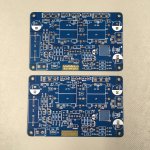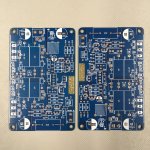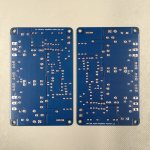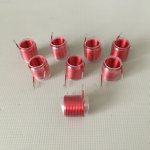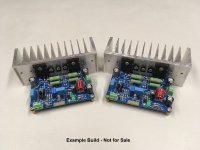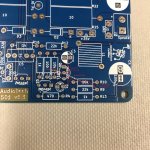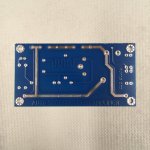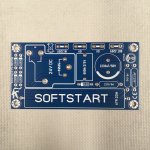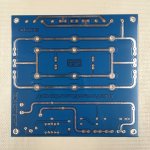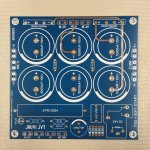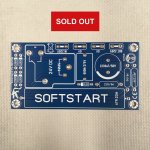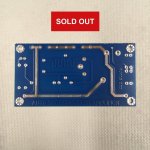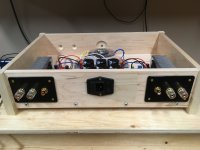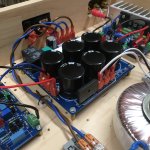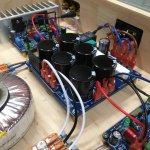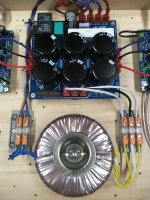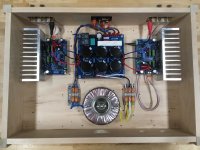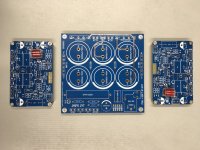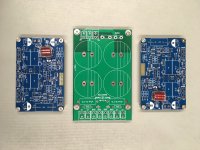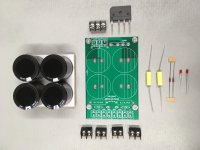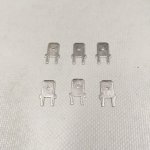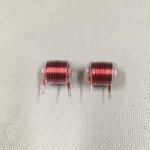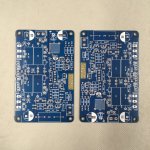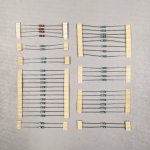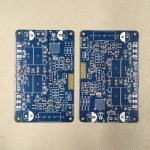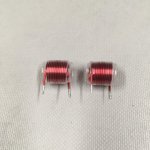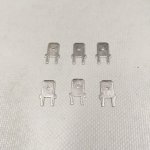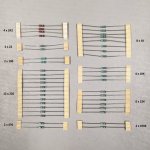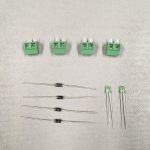JohnAudioTech JAT501 Class AB Amplifier PCBs from JLCPCB
4 of 5 pairs sold. Last final set remaining.
$10 Canadian plus shipping.
Made from JohnAudioTech's publicly available JAT501 gerber files.
No modifications to John's design were made.
Inline layout, board revision 1.1
High quality PCBs. Standard 1.6 mm thickness, and completely flat.
Two layer, double sided, blue solder mask.
This sale is not for profit. It is being offered as a service to the community. And to help promote John's channel.
These are just the bare PCB boards. You have to source your own components, assemble, and test.
Bill of Materials (BOM) including part numbers is also provided.
Includes two hand made and tested Thiele network coils (labeled L1)
Shipping within Canada is $3.00 using Canada Post oversized letter mail (sorry no tracking).
Shipping to USA is $10.00 using Canada Post Tracked Packet - USA. Includes a tracking number.
Known issue, the board stencil has some typos.
Transistors labeled 2N5551C should read 2N5551.
Transistors labeled 2N5401C should read 2N5401.
The "C" variant has a different pinout.
2N5551 / 2N5401 (1. Emitter 2. Base 3. Collector)
2N5551C / 2N5401C (1. Emitter 2. Collector 3. Base)
One board has scratched solder mask that happened at the factory. The exposed copper was tinned. The traces are ok. See attached photos.
4 of 5 pairs sold. Last final set remaining.
$10 Canadian plus shipping.
Made from JohnAudioTech's publicly available JAT501 gerber files.
No modifications to John's design were made.
Inline layout, board revision 1.1
High quality PCBs. Standard 1.6 mm thickness, and completely flat.
Two layer, double sided, blue solder mask.
This sale is not for profit. It is being offered as a service to the community. And to help promote John's channel.
These are just the bare PCB boards. You have to source your own components, assemble, and test.
Bill of Materials (BOM) including part numbers is also provided.
Includes two hand made and tested Thiele network coils (labeled L1)
Shipping within Canada is $3.00 using Canada Post oversized letter mail (sorry no tracking).
Shipping to USA is $10.00 using Canada Post Tracked Packet - USA. Includes a tracking number.
Known issue, the board stencil has some typos.
Transistors labeled 2N5551C should read 2N5551.
Transistors labeled 2N5401C should read 2N5401.
The "C" variant has a different pinout.
2N5551 / 2N5401 (1. Emitter 2. Base 3. Collector)
2N5551C / 2N5401C (1. Emitter 2. Collector 3. Base)
One board has scratched solder mask that happened at the factory. The exposed copper was tinned. The traces are ok. See attached photos.
Attachments
Last edited:
See the following diyAudio thread for more information on the JAT501 build.
JohnAudioTech JAT501 Build Thread
JohnAudioTech JAT501 Build Thread
I made the coils myself. See the build thread link above. I document the process of making the coils and test them to verify they work.
Linear power supply and soft start PCBs designed by CBZ Project also available. Combined shipping on multiple items.
PCBs sold at cost. No profit from the sale of items designed by others.
The PCBs are stenciled for 220 volts, but can be used with 110-120 volts if the dropper and filter capacitors are replaced with different values.
Also the PCB is stenciled for 10,000uF / 100V filter/smoothing capacitors. Less capacity and lower max voltage capacitors can be used instead.
PCBs sold at cost. No profit from the sale of items designed by others.
The PCBs are stenciled for 220 volts, but can be used with 110-120 volts if the dropper and filter capacitors are replaced with different values.
Also the PCB is stenciled for 10,000uF / 100V filter/smoothing capacitors. Less capacity and lower max voltage capacitors can be used instead.
Attachments
Last edited:
The completed JAT501 and Power Supply boards shown in previous posts are available for purchase in a completed power amplifier. Listed on Canuck Audio Mart from seller ebunnube. See the following link for more information.
FOR SALE: JohnAudioTech JAT501 Class AB Amplifier Stereo Power Amp
FOR SALE: JohnAudioTech JAT501 Class AB Amplifier Stereo Power Amp
More options available:
- JAT501 boards, coils, and CBZ Project PSU board with soft start.
- JAT501 boards, coils, and ebay PSU board no soft start.
- JAT501 boards, coils, and ebay PSU board no soft start. PSU board as a kit.
Attachments
4 of 5 pairs sold. Last final set remaining.
Made from JohnAudioTech's publicly available JAT501 gerber files. No modifications to John's design were made. Inline layout, board revision 1.1, two layer, double sided, and blue solder mask.
$10 Canadian plus shipping. This sale is not for profit. It is being offered as a service to the community. And to help promote John's channel.
**** Note — This is a sharing article and does not represent anyone's situation.
The JohnAudioTech JAT501 is a DIY Class AB audio amplifier designed by John, a well-known figure in the audio DIY community. He’s shared positive experiences building the JAT501 and praised how easy it is to follow his instructional videos.
The JAT501 offers a strong foundation for anyone interested in building a high-quality Class AB amplifier. Its open-source design encourages both customization and learning, making it a great choice for hobbyists at any level.
But despite the quality of projects like this, DIY audio gear is often undervalued. Even well-made, high-performance amps sometimes struggle to gain attention or fair pricing. Here’s why:
- Lack of Brand Recognition
People often rely known brands, even if a DIY project matches or exceeds their quality. - Perceived Risk
Buyers worry: “What if it breaks? Who will fix it?” That uncertainty can be a big turn-off. - Limited Exposure
DIY builders usually sell through forums or local listings, reaching only groups—often other builders who aren't looking to buy. - Invisible Labor
A builder might spend 40+ hours on an amp, but buyers don’t see that. They compare it to commercial gear without recognizing the effort or craftsmanship behind it. - Price Anchoring
People often compare DIY prices to factory-made gear, not realizing handmade amps may use higher-quality parts and better construction. - Fear of Non-Standard Design
Some buyers assume DIY gear isn’t safe enough or properly designed, even when that’s not the case.
- Sharing builds and walkthroughs on YouTube or forums
- Offering demos or sound tests
- Highlighting premium components and unique features
Added a complete set of 1/2 watt resistors. All are Vishay 1% from DigiKey. See attached photo.
4 x 2R2, 2 x 22, 2 x 100, 12 x 220, 2 x 470,
8 x 1K, 4 x 10K, 6 x 22K, 2 x 470K
4 x 2R2, 2 x 22, 2 x 100, 12 x 220, 2 x 470,
8 x 1K, 4 x 10K, 6 x 22K, 2 x 470K
Attachments
Last edited:
Added four 4936 diodes, two green LEDs, and four connectors. Latest photos below show all items included.
